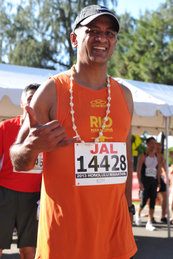 The Bank of America Chicago Marathon is less than five months away, and Apna Ghar is thrilled to have two runners racing and raising money for us. One is a veteran marathoner in his 50s, the other a 32-year-old newlywed who has never run a marathon. Here’s why they’re doing it and how you can support them. Mohan Iyer, 53 Oakbrook Terrace Chief information officer (CIO) for Mesirow Financial Married with two sons From: Baroda, India (moved to U.S. in early 1990s) Marathons run: 40, and one of them was an ultra-marathon of 35 miles; he has run the Chicago marathon four times Total races run: 74 (see the list here) Running schedule: Mohan has run one full marathon every month for the last 3 years. This year, his goal is to run 14 marathons (14 in 2014). So far, he’s done six, including Boston, and before the Chicago marathon, he will have traveled to Alaska, Switzerland, Iceland, Sioux Falls, Omaha and Portland for marathons (the Switzerland race is an ultra-marathon of 48.5 miles). He also runs frequent half-marathons. Running for: Six years Why did you start running? “A combination of mid-life crisis and motivation from my doctor.” Why run for Apna Ghar? “I was looking for a charity to run for, and the name jumped out at me. I didn’t expect to see a Hindi name, and I know exactly what Apna Ghar means. There are very few causes like this, taking care of immigrant women and fighting domestic violence.” Website: www.mohaniyer.com Donate to Mohan and Apna Ghar 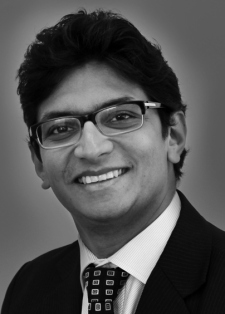 Kunal Shah, 32 The Loop Senior consultant, Roland Berger Strategy Consultants Married From: Born in Boston, grew up in Mumbai, moved to the United States to attend Indiana University; lived in Chicago for five years and then moved to London for three years, moved back to Chicago last year Marathons run: None, though Kunal and his wife, Leslie, trained for the 2012 New York Marathon that was canceled because of Hurricane Sandy Running schedule: Kunal doesn’t have much race experience, but he has run long distances, often of between 12 and 15 miles, for many years for exercise Marathon strategy: Start with “boot camp” at the gym in the hopes of losing at least 5 or 6 pounds, then train with the Chicago Area Runners Association Running with the wife: Kunal and Leslie, who married last June, will run the race side-by-side; Leslie is raising money for the Big Shoulders Fund, which supports Catholic schools in Chicago Why run for Apna Ghar? “Although I was born in and am a citizen of the U.S., I identify closely with our immigrant population, as I too grew up in India and am in large part an immigrant myself. Of the immigrant population here in the U.S., there is large percentage that is less fortunate than me. It is the children within this subsection that regrettably don’t have the same opportunities and benefits that I was lucky enough to receive that I would like to raise money for and represent in this marathon.” Donate to Kunal and Apna Ghar
0 Comments
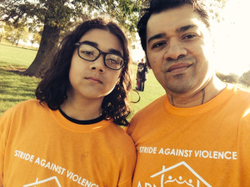 On Tuesday, April 15, Apna Ghar will celebrate its annual Volunteer Appreciation Event. There’s still time to RSVP; see details here. To highlight the importance of volunteers to all that we do, we sat down for a Q&A with loyal volunteer Syed Rizvi. Syed, 42, is a technology director who lives in Avondale with his wife and son, 12-year-old Nicholas. Syed and Nicholas have volunteered at the Stride Against Violence 5K Run/Walk for the last several years (3 or 4 so far, they don’t count). Q. How did you end up volunteering with Apna Ghar? A. I have an Indian background, and I was aware that Apna Ghar started with the intention of helping women of Asian descent. I felt this was an organization I could relate to more closely than other volunteer work I had done. I didn’t have the emotional connection to the other charities. With Apna Ghar, the organizers came from the same culture I did, helping those with the same issues I had experienced firsthand. Q. Why bring your son along? A. As his father, it’s my responsibility to be a good role model to him. I’m trying to raise him to one day be a good man, a good husband, a good father and to have empathy for others. Q. Do you talk to Nicholas about violence against women? A. My son is very aware of how my father treated my mother as well as my brother, my sister and me. He was emotionally and physically and verbally abusive. It is very clear to my son how I feel about cowards who treat women as anything less than equal. Q. What does volunteering at the 5K entail? A. I try to get to the walk early and leave late to make sure I do as much as I can. I’m a bit stronger, so I can help set up and move heavier stuff around. Last year I got to work the food tent where we passed out water and fruit. I try to do whatever is needed. It’s very rewarding for me because there is so much important work that the people in the organization do. If I can help out with the basic things, it will allow them more time and energy to do more important work. Q. What effect do you think the experience has had on Nicholas? A. About a month ago, he offered to volunteer for an organization that sends hand-packed meals specifically formulated for malnourished children to be shipped to nearly 70 countries around the world. He asked me if I would join him. Obviously I had to say yes, to make up for all the early mornings he came with me. It’s great that he’s coming up with his own ideas and desire to help. Q. Did you feel proud? A. Yes. I am, without any doubt, the luckiest father in the world. What sounds better than eating a lot of delicious food for an important cause? If you said, “nothing,” we have good news: Apna Ghar’s annual opportunity to do just that is coming up soon.
This year’s Taste for Life, which supports Apna Ghar’s work for women and children whose lives have been affected by domestic violence, is Thursday, May 1 at the Chicago Cultural Center, 78 E. Washington St. The featured chef is pastry chef Gale Gand (you know her from TV), and the featured speaker is Ann Mukherjee, senior vice president and chief marketing officer of Frito-Lay North America. Now, what can you eat once you get there?
Hungry yet? Check out your ticket options, and we hope to see you there. 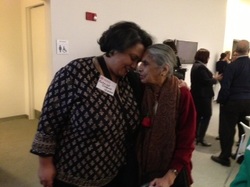 Radhika Sharma, Manager of Outreach and Education at Apna Ghar, embraces Kanta Khipple at the Chicago Foundation for Women Impact Awards. Photo courtesy of Radhika Sharma. Radhika Sharma, Manager of Outreach and Education at Apna Ghar, embraces Kanta Khipple at the Chicago Foundation for Women Impact Awards. Photo courtesy of Radhika Sharma. Kanta Khipple was a 14-year-old in India when she was first inspired by the activism ofMohandas Gandhi to make the world better for women and girls. Today, no one can deny that she’s done just that. Now in her 80s, Khipple was honored by the Chicago Foundation for Women (CFW) with a 2014 Impact Award. Khipple is one of the founders of Apna Ghar and a 60-year veteran of public health and social welfare work around the world, from her native India to the Caribbean and, thankfully, right here in Chicago. She founded Apna Ghar with four other women in 1989 to give Asian immigrant women – and all women in need – a safe haven from violence where they could rebuild their lives. CFW honored five women, including Khipple, “for their dedication to increasing the resources and opportunities for women and girls in the Chicago area.” The awards ceremony was held on March 13 at the Spertus Institute for Jewish Learning and Leadership in the Loop. During a video shown at the ceremony, Khipple said she was motivated as an adolescent to work in social justice because of Gandhi’s philosophy of nonviolence. She also pointed out that CFW was the first organization to fund Apna Ghar, offering a sorely needed grant in the agency’s early days. In the recording, Khipple said: “I am proud to say here now today before all of you that Chicago Foundation for Women was the first organization which gave us a very small grant…(it’s) interconnected, how we work together.” Khipple’s long career is difficult to summarize, but her daughter, Ranjana Khan, a board member of Apna Ghar, provided some highlights: Khipple earned her first social work degree in India and worked on family planning and health in the 1950s before moving to Sweden for a university fellowship. In the 1960s, she moved to the U.S. to complete a Master of Public Health at the University of Michigan, and then, in 1970, she accepted a job in the Caribbean with the World Health Organization, the public health arm of the United Nations. She was tasked with educating citizens in several nations about maternal and child health. In 1986, she moved to Chicago, where for a brief time she was executive director of Asian Human Services. She also, of course, founded Apna Ghar, as well as a few now-inactive projects, including a senior center and an AIDS foundation. She and her husband live in Evanston and have three children. Khan, her daughter, was present as her mother received the CFW award. “It’s quite emotional,” she said, “because it all comes from her heart. She’s just so passionate about it.” Or, as Khipple put it in the video: “I have never left serving women and girls in all my capacity.” Because of that, she gives younger generations what Gandhi once gave her: inspiration to change the world. More on Kanta Khipple: Read an interview of Khipple conducted by her daughter, Ranjana Khan, and published last year by Apna Ghar. Read Executive Director Neha Gill’s nomination of Khipple for the award. – Meredith Heagney mheagney84@gmail.com I remember when I found AG’s Executive Director Serena Low’s email in my inbox asking to speak to me on the phone about a summer internship. It was March, and I was gearing up for finals, a campaign for Class Council president, and my trip back home to Chicago after an adventure-filled sophomore year at The George Washington University. Summer swiftly approaching, I was eager to have my summer plans figured out. Being from a small suburb, there was never much to do at home but watch Netflix until my eyes drained from my skull and read books of different of characters making a true difference in their worlds of 400 pages.
400 pages were all it took. A character could break away from her ordinary life, strive to be something greater, and end up showing her entire society what it means to be a hero. She could be Emma Woodhouse, Jane Eyre, or my personal favorite, Hermione Granger. The pages of these books were filled with struggle and adventure, something I thought I knew little about. I truly believed that in order to be great, you had to accomplish a feat that would change the course of a society. Small acts didn’t cut it. My time at Apna Ghar has taught me that there is so much more to strength, bravery, and independence than what I knew. From the bubbly and outgoing legal advocates to the sweet and caring counselors, each and every individual on the Apna Ghar staff excels in their department professionally and flourish even more as kind and genuine people. What I have learned is that working in non-profits takes dedication and big heart, true signs of today’s heroes. During my four months here, I’m sure that there were more than 400 small acts carried out by these wonderful staff members. Each act made a difference in the lives of survivors of domestic violence and changed their path for the better. I would sincerely like to thank the Apna Ghar staff for welcoming me with open arms and becoming more than co-workers. You are all friends I will never forget! This post was written by Kulsoom Jafri. Kulsoom is a junior studying Political Communication and Philosophy at The George Washington University and was a summer intern and volunteer at Apna Ghar Many women’s issue organizations are recently welcoming men into leadership positions for the first time since their establishment. However, Apna Ghar (Our Home), Inc. has been led by both women and men since its founding in 1989. “Our mission, from the beginning, included gender, nationality, orientation, and diversity,” said Apna Ghar co-founder Kanta Khipple. “This objective was set when our organization started.”
Men have contributed to various leadership positions throughout Apna Ghar’s history as Associate Board members, Directors, as well as Presidents and Vice Presidents. The current board’s President, Saiyed G. Rabbani and Vice President, Sameer Chhabria are both male. “We don’t discriminate based on gender,” said Khipple. “In fact, we encourage men to be involved in Apna Ghar for domestic violence awareness. It is a teaching point for men.” According to Khipple, recruiting board members, regardless of gender, requires an intensive interview that focuses on the applicant’s desire to aid the cause and their attitude on women’s issues. “Our goal is to strike the right balance of men and women on the board, in terms of numbers.” 52% of current board members are male. Khipple admits that forming a board for a women’s organization is not an easy task. Selecting board members takes careful consideration: the attitude, behavior, education, and background of an applicant are all of high importance. Board Member John Kerastas has worked with non-profits for several years and has found Apna Ghar to hold a gold standard in the area of domestic violence issues. “Diversity is far broader than gender on the Apna Ghar Board. We focus on skills sets,” he said. “How can we build the best most powerful, supportive organization?” Kerastas worked in Japan for seven years and learned an important lesson in being a true advocate for those in need. “Japanese people come in all shapes, sizes, and ethnicities. We help regardless,” he said. “Sex is a shallow way to look at things. Deeper thing is to look in their heart.” Board Member Dipankar Mukhopadhyay admits that the issue of gender leadership in women’s issues has crossed his mind. “Gender doesn’t bring any special expertise. Understanding of the issue does.” As a board member for six years and a retired pediatrician, Mukhopadhyay dealt with victims of child abuse. “Although Apna Ghar’s immediate clients are women, boys may also be involved in household. There should be no gender bias. Domestic violence is violence, period.” Sameer Afsar, Associate Board Chair, finds that there is a source of validation of a cause when men support women’s issues. “It’s sad to say, but in our community, there is a difference between women supporting women and ‘people’ supporting women,” he said. “Should that be the case? Absolutely not.” Afsar believes that women’s issues are on par with any issues in the community. “Attitude needs to change,” he said. Mukhopadhyay recognizes another positive effect of men leading women’s organiztions. “Within ethnic groups, men may not deny the issue of violence,” he said. “However, by having men open up and recognize the issue further, it allows other men to also open up and advocate for the issue.” Even still, organizations that focus on women’s issues with women leaders are widely popular. “Women’s organizations led by women may find themselves talking about issues specific to them in a safe area, a kind of sanctuary,” Kerastas said. “But, I don’t see this issue as men and women. I see victims and people who can help.” Kerastas has this advice for men seeking to advocate for women’s issues: “Be honest, have heart, get involved in issues that you have a passion for, have time to get involved, and have something functionally to contribute to. In almost all cases, there’s something you can do.” This post was written by Kulsoom Jafri. Kulsoom is a junior studying Political Communication and Philosophy at The George Washington University and was a summer intern and volunteer at Apna Ghar. by: Naomi Anurag Lahiri 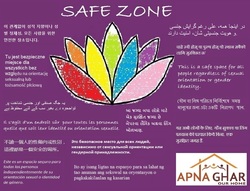 This image is a safe zone sign I made specifically for Apna Ghar when I first started working at the shelter. As a new Apna Ghar advocate, I was excited to find that our agency was staffed by people who treat queer1 and trans2 clients with thoughtful sensitivity and respect. I wanted to make this more overtly visible to clients, so I made a sign. The rainbow represents the LGBTQ community, the lotus flower is often used in a South Asian context and the purple is the color for domestic violence awareness. Advocating for cultural competency in regards to both trans, queer and desi3populations is something I have been dedicated to for years. However, it was only until working at Apna Ghar that I have felt I’m able to do all at the same time. On July 4-6thI attended DesiQ, an international conference held by Trikone in San Francisco and Oakland for trans and queer South Asians. This conference doesn’t happen more than every 5 years so I felt privileged to be able to attend at this point in my life. I gained a lot of knowledge to bring back to my Chicago community and Apna Ghar. During workshops, the open-mic night, and performances during the Gala, I witnessed the stories of abuse and trauma that other community-members, younger and older, carried with them. These realizations and stories were difficult and painful, but necessary. The abuse that desi parents, friends, community members and strangers perpetrate towards trans and queer desis is often normalized. It is simply expected that trans and queer desis will experience emotional, physical and/or verbal abuse regarding their gender identity, gender presentation, or their sexuality. I was reminded to not be a bystander to other people’s issues of depression, suicidality and substance abuse that are still prevalent in the community. While I was vocal about these things a few years ago, with time and experience I just started to accept these things as a reality. I know it is not acceptable for me, as a social worker and activist, to be quiet and let these issues get pushed under the rug. I am now feeling grounded and inspired to bring this renewed energy to my work at Apna Ghar and in the community. I find it extremely meaningful that culturally sensitive agencies like Apna Ghar, as well as individuals, can make our needs heard. At this conference I was made aware of new (to me) ways we can be transformative4 in our justice-seeking and healing in every space we inhabit. For example, not every experience at the conference was healing for all attendees and not every workshop or event was on point, politically and socially. However, I feel that we came together and addressed these issues in an inspiringly transformative way during our community check-ins. During the check-ins, conference attendees shared their feelings, concerns and experiences, and some ideas on how to move forward as a community. We came together to address that transphobia and rape jokes should not be permitted in our spaces as they are meant to be safe, healing and nurturing. Upon reflection, I saw parallels and how we can continue trying these different methods of community-building and support at Apna Ghar, especially the shelter. I hope to be more mindful of these approaches in my own work at Apna Ghar. On the topic of transformative justice, I was pleased and surprised by the workshop on violence in the South Asian community by Tina Oza and Preeti Mangala Shekar. This was not a basic presentation about violence in the South Asian community. We got to discuss the barriers and limitations we face in the social service industry, as well as the innovative ways we can overcome some of them. Attendees shared their ideas and experiences addressing violence in the community. With survivors facing barriers like fearing being outed by the abuser, or being deported if they approach the legal system, we discussed the possible ways we can hold abusers accountable without involving outsiders and the systems that were not designed to protect these survivors. One example that someone gave was a situation where a community agreed to provide a safe space for the victim by notifying the abuser that he could not attend their events or be present in their spaces. These learning moments continued as the weekend went on. After the DesiQ conference wrapped up, a group of us got together in Berkeley to train to be call-takers for the DeQH (South Asian LGBTQ) helpline. People call this helpline with issues of isolation, violence, depression, suicidality, and many, many others. Just like I feel so privileged to have had the opportunity to give back for a year and a half at Apna Ghar, I am also thankful that I am able to use my skills and experience to take calls and give back in this way. 1 = a reclaimed term used by and for sexual and gender minorities. 2 = this term attempts to cover identities including but not limited to androgyne, agender, bakla, bigender, genderqueer, hijra, kathoey, kothi, non-binary, third gender, transgender, transsexual, and two spirit. 3 = a term used by people from South Asia and the South Asian diaspora. 4 = transformative justice is a way of addressing crime within a community, beyond the legal system. This process involves communication and collaboration between the victim |
CONTACT US
4350 NORTH BROADWAY, 2ND FLOOR, CHICAGO IL 60613
MAIN: 773 883 4663 | SKOKIE: 847 983 4099 | SOUTHSIDE: 773 697 3272
Email: [email protected]
APNAGHAR.ORG | @APNAGHARINC
24-HOUR CRISIS SUPPORT
Phone: (773) 334 4663 | Text: (773) 899 1041 | Email: [email protected]
MAIN: 773 883 4663 | SKOKIE: 847 983 4099 | SOUTHSIDE: 773 697 3272
Email: [email protected]
APNAGHAR.ORG | @APNAGHARINC
24-HOUR CRISIS SUPPORT
Phone: (773) 334 4663 | Text: (773) 899 1041 | Email: [email protected]
Together we can end gender violence
Copyright © 2020 Apna Ghar, Inc.

 RSS Feed
RSS Feed